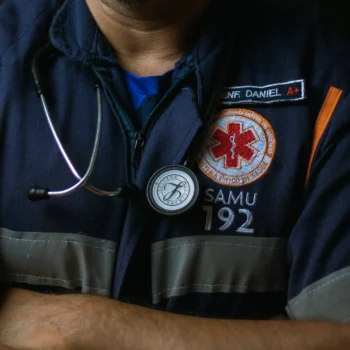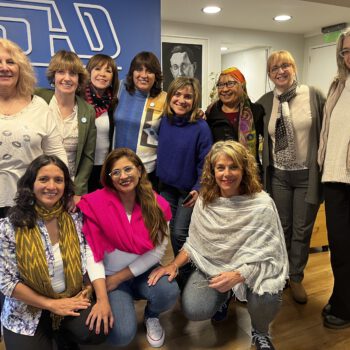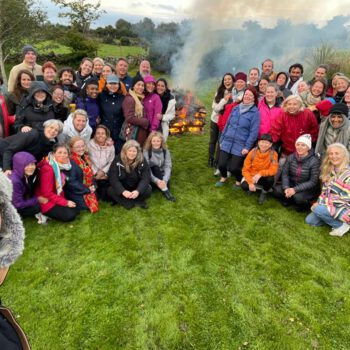An expert in healing individual, family, and collective trauma, Amy pioneered the introduction of trauma- informed development and psycho-spiritual principles into leadership programs. Since 2005, she has served as a co-founder and CEO of Mobius Executive Leadership. A senior student and lead faculty with mystical teacher, Thomas Hübl, they collectively created a year-long Trauma-Informed Consulting and Coaching Certification.
This short edited excerpt of Amy’s interview arcs from early ‘failed’ corporate training to today’s effective cutting edge trauma and psycho-spiritual education. Listen to her full interview on The Gifts of Trauma.

An organization starts to feel the need for deep exploratory work after first following a progression of short, behavioral interventions to address executive or team dysfunction. These processes may provide some short term improvements, but no long-term behavioral change.
I witnessed 20 years of organizational interventions that failed, or lacked sustainability. In the face of that, people asked: “Why do so many change efforts fail? Why do so many leadership programs not produce the cultural shifts in mindset and behavior, in success, that we wish for?” In a very organic response to seeing what didn’t work, I kept inquiring “With what holding and support can this deeper work be done? At what depth? With what profundity?” These questions offered the possibility of defining a whole new terrain of exploration… of imagining something far more radical and potent.
This new approach is needed today by organizations facing situations of such complexity, no single person can grasp them. It can take a variety of voices to even diagnose a problem, multiple interpretations to make meaning of it, and an assortment of interdisciplinary intelligences to solve it. This sort of collective ecosystem requires enough psychological safety, trust and belonging for people to discuss ideas robustly, to endure productive conflict and to truly welcome developmental feedback. This need creates a very real business mandate to free up people’s energy to be available to use in ways that are more wholesome, more joyous, more alive and more creative.
Like many healers, I came to this work after my own journey from trauma to self discovery and integration. I was blessed with extraordinary therapists, bodyworkers and healers who accompanied me in that process. Because my life called me to this journey, I understand the gifts and grace that are possible on the other side. Today I’m at peace in ways that were unthinkable 40 years ago. I’m capable of things that seemed impossible 40 years ago. Having experienced that everything can be healed, I deeply believe in life unleashed. I bring that conviction and fire into the classroom when I work with executives who’ve spent most of their life chasing the next reward, the next status symbol, the next prestigious opportunity, the next external benchmark of success. They haven’t taken the time, had the self permission or strength, to turn backwards towards the hurt parts of themselves. I am part of that invitation, that turning, inviting people to go back and reclaim aspects of themselves that they long ago abandoned. It always moves me to tears. And because I know how grateful they’ll be on Friday, I’m not daunted by how shut down or resistant they are on Sunday.
I believe that when the student is ready, the teacher will appear. It’s been my experience that once you set the intention to go on this inner journey, higher realms align very quickly, sending messengers and resources. I met Thomas [Hübl] 12 years ago, an extraordinary encounter with someone who is not only a master therapist and a visionary healer, but a prophetic voice for what it might look like to restore the scars in the fabric of humanity. He expanded what I believed was possible, refined me, trained me, supervised me… All the Mobius practitioners have studied with him, as a community, for over a decade. I have great confidence that the cutting edge trauma work we’re doing in the business world today is hugely informed and emboldened by Thomas’ call to action.
In corporate life, and in society, the level of numbness, regression and dissociation many senior people work within are big secrets. Their untreated trauma lenses shape our choices collectively, as a society, in every institution; medical, educational, governmental and business. Their numbness is with them when they make choices on policy, on compensation, on organizational design, on their sustainability policy. Until we help them cultivate, mature and refine their moral capacities, we won’t make wise corporate or social choices.
Part of the unlock for societal health is to attend to our generations of unhealed trauma and collective numbness, so that we can feel each other and the planet, so that we can feel the river and the sky, so that we can feel our own hearts and the person next to us who’s hurting and make gestures of care. In the absence of the heart being an open instrument of information and guidance and diagnostic capacity, we can’t even accurately identify problems.
The standard workplace is disembodied. It’s anti emotion, anti relation and puts a huge emphasis on autonomy, resilience and self sufficiency. We value leaders who don’t need us, but actually, it takes a village. So this idea that we can privatize our interior and relational lives and leave them outside the workplace is a nonsensical and hugely exhausting dysfunction. It makes people lonely, so they over-work and over-extend and over-give. They’re constantly plugged into the churn of new information, and the demands of day to day work.
What I see with thousands of leaders when we slow them down… When they give themselves permission to reinhabit their bodies and open their hearts, to tap into their intuition and feel part of a larger whole, the restoration process only takes a few days. It’s actually a more natural human condition to be in a rhythm of embodiment and relation, in a rhythm of being part of something wider. So when the barriers built into the technical industrial model of the workplace are removed, the alternative flourishing happens spontaneously. That’s why I feel very hopeful about what I’m describing. It’s very far away from how we’re doing it now, but it’s not all that far away from the frontier of each individual leader’s possibility.
I don’t think there’s ever been a more urgent moment to humanize the workplace than this period of such extraordinary adaptive demand, with AI, with economic insecurity and political instability. All of that chaos and ambiguity creates such anxiety for people that our workplaces have to become places of soothing and mutual support.
The Gifts of Trauma is a weekly podcast that features personal stories of trauma, transformation, healing, and the gifts revealed on the path to authenticity. Listen to the interview, and if you like it, please subscribe, leave a rating or review, and share it with others in your community.



